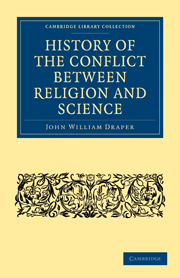Book contents
- Frontmatter
- Preface
- Contents
- CHAPTER I THE ORIGIN OF SCIENCE
- CHAPTER II THE ORIGIN OF CHRISTIANITY.—ITS TRANSFORMATION ON ATTAINING IMPERIAL POWER.—ITS RELATIONS TO SCIENCE
- CHAPTER III CONFLICT RESPECTING THE DOCTRINE OF THE UNITY OF GOD.—THE FIRST OR SOUTHERN REFORMATION
- CHAPTER IV THE RESTORATION OF SCIENCE IN THE SOUTH
- CHAPTER V CONFLICT RESPECTING THE NATURE OF THE SOUL.—DOCTRINE OF EMANATION AND ABSORPTION
- CHAPTER VI CONFLICT RESPECTING THE NATURE OF THE WORLD
- CHAPTER VII CONTROVERSY RESPECTING THE AGE OF THE EARTH
- CHAPTER VIII CONFLICT RESPECTING THE CRITERION OF TRUTH
- CHAPTER IX CONTROVERSY RESPECTING THE GOVERNMENT OF THE UNIVERSE
- CHAPTER X LATIN CHRISTIANITY IN RELATION TO MODERN CIVILIZATION
- CHAPTER XI SCIENCE IN RELATION TO MODERN CIVILIZATION
- CHAPTER XII THE IMPENDING CRISIS
- INDEX
CHAPTER VII - CONTROVERSY RESPECTING THE AGE OF THE EARTH
Published online by Cambridge University Press: 29 August 2010
- Frontmatter
- Preface
- Contents
- CHAPTER I THE ORIGIN OF SCIENCE
- CHAPTER II THE ORIGIN OF CHRISTIANITY.—ITS TRANSFORMATION ON ATTAINING IMPERIAL POWER.—ITS RELATIONS TO SCIENCE
- CHAPTER III CONFLICT RESPECTING THE DOCTRINE OF THE UNITY OF GOD.—THE FIRST OR SOUTHERN REFORMATION
- CHAPTER IV THE RESTORATION OF SCIENCE IN THE SOUTH
- CHAPTER V CONFLICT RESPECTING THE NATURE OF THE SOUL.—DOCTRINE OF EMANATION AND ABSORPTION
- CHAPTER VI CONFLICT RESPECTING THE NATURE OF THE WORLD
- CHAPTER VII CONTROVERSY RESPECTING THE AGE OF THE EARTH
- CHAPTER VIII CONFLICT RESPECTING THE CRITERION OF TRUTH
- CHAPTER IX CONTROVERSY RESPECTING THE GOVERNMENT OF THE UNIVERSE
- CHAPTER X LATIN CHRISTIANITY IN RELATION TO MODERN CIVILIZATION
- CHAPTER XI SCIENCE IN RELATION TO MODERN CIVILIZATION
- CHAPTER XII THE IMPENDING CRISIS
- INDEX
Summary
Scriptural view that the Earth is only six thousand years old, and that it was made in a week.—Patristic chronology founded on the ages of the patriarchs.—Difficulties arising from different estimates in different versions of the Bible.
Legend of the Deluge.—The repeopling.—The Tower of Babel; the confusion of tongues.—The primitive language.
Discovery by Cassini of the oblateness of the planet Jupiter.—Discovery by Newton of the oblateness of the Earth.—Deduction that she has been modeled by mechanical causes.—Confirmation of this by geological discoveries respecting aqueous rocks; corroboration by organic remains.—The necessity of admitting enormously long periods of time.—Displacement of the doctrine of Creation by that of Evolution—Discoveries respecting the Antiquity of Man.
The time-scale and space-scale of the world are infinite.—Moderation with which the discussion of the Age of the World has been conducted.
The true position of the earth in the universe was established only after a long and severe conflict. The Church used whatever power she had, even to the infliction of death, for sustaining her ideas. But it was in vain. The evidence in behalf of the Copernican theory became irresistible. It was at length universally admitted that the sun is the central, the ruling body of our system; the earth only one, and by no means the largest, of a family of encircling planets.
- Type
- Chapter
- Information
- History of the Conflict between Religion and Science , pp. 182 - 200Publisher: Cambridge University PressPrint publication year: 2009First published in: 1875



